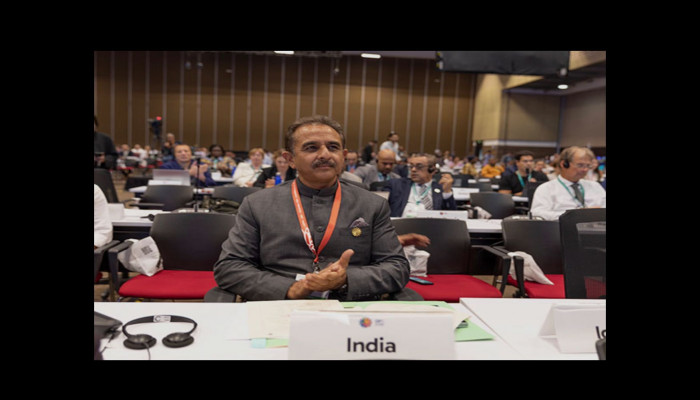India seeks international support for Biodiversity Action Plan at COP16
- In Reports
- 07:30 PM, Oct 30, 2024
- Myind Staff
India has formally sought international financial assistance to support the implementation of its National Biodiversity Action Plan, scheduled for an updated release on November 31. Minister of State for Environment, Kirti Vardhan Singh, made this appeal during India's statement at the 16th Conference of the Parties (COP16) to the Convention on Biological Diversity, held in Cali, Colombia, on Tuesday (early Wednesday in India). At COP16, representatives from various governments gathered to assess progress on the Kunming-Montreal Global Biodiversity Framework, with the conference set to conclude on November 1.
Singh emphasised the necessity of providing adequate resources, including financial support, in line with Target 19 of the Kunming-Montreal Global Biodiversity Framework, to ensure the effective implementation of India’s National Biodiversity Strategy and Action Plan. He highlighted the need for substantial efforts to establish accessible means of implementation, noting that financial resources, technology, and capacity-building are critical to achieving this with the required speed, scope, and scale.
India has set its national biodiversity targets to align with the global targets outlined in the Kunming-Montreal Global Biodiversity Framework, which includes 23 action-oriented targets for urgent implementation through 2030. These targets are designed for immediate action by parties, including India, with the aim of contributing to broader, outcome-oriented goals set for 2050.
India’s biodiversity targets include conserving 30% of its land and waters, with a commitment to uphold participation, justice, and rights for Indigenous peoples, local communities, women, youth, persons with disabilities, and environmental defenders. Additionally, India aims to promote sustainable consumption choices and cut food waste by half.
The nation plans to embed the diverse values of biodiversity into decision-making processes at all levels. It is committed to ensuring fair and equitable sharing of benefits from genetic resources, digital sequence information, and associated traditional knowledge. To reduce environmental harm, India intends to cut nutrient loss and pesticide risks by 50% and reduce the introduction and establishment of invasive alien species by the same rate.
Singh said India has taken a significant step in global wildlife conservation by establishing the International Big Cat Alliance to protect the world’s seven major big cat species, as their presence indicates healthy ecosystems and rich biodiversity. “India’s efforts in rejuvenating sacred river Ganga through the ‘Namami Gange’ Mission was duly recognised by the United Nations as one of the top 10 World Restoration Flagships to revive the riverine ecosystem.”
Singh highlighted that India’s Ramsar sites, wetlands of international significance, have grown from 26 to 85 since 2014, with plans to reach 100 soon. He emphasised that “Peace with Nature” has been a core part of India’s cultural heritage since the Vedic age, aligning with the global “Lifestyle for the Environment” (LiFE) movement, an India-led initiative encouraging environmentally sustainable lifestyles.
As COP16 entered its second and final week on Monday, delegates prepared for high-level negotiations. Progress was made with the approval of conference room papers (CRPs) under the Cartagena Protocol, addressing compliance, risk assessment, risk management, and the detection and identification of living modified organisms. However, the Earth Negotiations Bulletin, which monitors global environmental and sustainable development talks, reported that some discussions proved challenging.
“Despite best efforts by Working Group II Chair Hesiquio Benítez (Mexico), disagreements persisted in discussions of CRPs on invasive alien species, biodiversity and health, and biodiversity mainstreaming. Unresolved matters included references to the Global Invasive Species Database, actions to ensure biodiversity and health co-benefits regarding Target 13 (benefit-sharing), and future work on mainstreaming, respectively,” it said.
Working Group II focused on conference room papers (CRPs) related to items under the Convention on Biological Diversity and the Cartagena Protocol on Biosafety, with text-based negotiations ongoing. In a significant commitment, Austria, Denmark, France, Germany, New Zealand, Norway, the UK, and Quebec (Canada) announced an additional $163 million pledge to the Global Biodiversity Framework Fund.







Comments